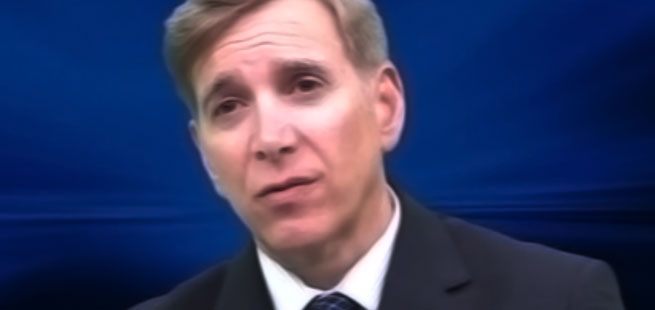
CERN, the European Organization for Nuclear Research, posted then deleted a video confirming the observation of what might have been the Higgs boson, also known by the rather sensationalist moniker, the “God” particle.
[aditude-amp id="flyingcarpet" targeting='{"env":"staging","page_type":"article","post_id":484017,"post_type":"story","post_chan":"none","tags":null,"ai":false,"category":"none","all_categories":"dev,","session":"A"}']“We’ve observed a new particle,” said Large Hadron Collider spokesperson Joe Incandela (pictured above) in the clip. “Its properties are still going to take us a little bit of time. But we can see that it decays to two photons, for example, which tells us it’s a boson.”
Later in the clip, Incandela says, “It could be ultimately seen that its properties are very consistent with the Standard Model Higgs.” [Emphasis added to discourage the appearance of hyperbole.]
AI Weekly
The must-read newsletter for AI and Big Data industry written by Khari Johnson, Kyle Wiggers, and Seth Colaner.
Included with VentureBeat Insider and VentureBeat VIP memberships.
A CERN spokesperson gave a statement to press that seems to suggest the entire video was a pre-recorded clip meant to be released in the event the Higgs boson was observed. “We have recorded several videos in advance, and it was a mistake that this one went live,” a CERN rep told The Telegraph. “We pre-recorded interviews with spokesmen from both [Large Hadron Collider] experiments, but this went live on the Internet due to a technical fault.”
Still, we ask you, do these words from Incandela sound like a pre-recorded, pre-written, coached victory speech?
I’m extremely tired at the moment, so I may not appear to be as excited as I really am, but the significance of this observation could be very very great.
For those of you who have not spent the past two years on the edge of your seats for the latest word from the literal scientific underground, if observed, the Higgs boson would validate the Standard Model of particle physics, also called the “theory of almost everything.” The Higgs boson was first theorized by a group of physicists in 1964. Since March 2010, physicists at the Large Hadron Collider have been actively conducting experiments to observe the elusive particle.
“Obviously, all of this is extremely preliminary,” Incandela says in the video. “We’re re-calibrating, and we’ll have better results, even on the current data, when we release at the end of the month. But it’s very exciting.”
VentureBeat's mission is to be a digital town square for technical decision-makers to gain knowledge about transformative enterprise technology and transact. Learn More